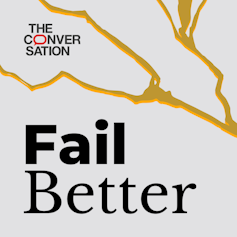GoodStudio/Shutterstock
Philosophically speaking, some kinds of failure are more interesting than others. Failing to make a meeting on time or not being able to get out of bed without hitting snooze at least once on your alarm would fall in the “less interesting” camp.
You can listen to more articles from The Conversation, narrated by Noa, here.
However, there is a different class of failures – those that may deeply affect our understanding of ourselves (known as our self-conception). Examples of these failures might be failing in your ambition to be a successful writer or musician, failing at your university degree, or your marriage ending. I’m going to call these “existential failures” here.
This kind of failure often comes with a cluster of strong negative emotions. When we fail in this way we might find ourselves feeling not just disappointed, but in some sense lacking worth or value. And when the failure is significant enough it could be accompanied by a loss of hope. This kind of failure plausibly involves a form of psychological suffering.
Telling success stories
What’s more, existential failure may be resistant to a culturally predominant narrative surrounding failure: that failure is a necessary ingredient of success.

This article is part of Fail Better, a series for those of us in our 20s and 30s about navigating the moments when things aren’t quite going as planned. Many of us are tuned into the highlight reel of social media, where our peers share their successes in relationships, careers and family. When you feel like you’re not measuring up, the pieces in this special Quarter Life series will help you learn how to cope with, and even grow from, failure.
There’s no doubt that some kinds of failure serve a purpose. For example, you will get better and can become successful at public speaking by, to various degrees, failing and then attempting to do better. The acquisition of a range of capacities and skills, both practical and cognitive, is arguably dependent on this process of failure.
These narratives of success provide a context within which to give failing – and some of the negative emotions associated with it – meaning and value. Notably, these success narratives are not just invoked when we finally reach success, such as nailing a presentation or landing a dream job after a series of terrible interviews. They are also used during the process of repeated failure. People are told to “stick at it” despite failing, given the promise of future success.

eamesBot/Shutterstock
In the case of existential failure, though, interpreting it as part of a path to success may not be possible – and to do so might run the risk of self-deception.
You might have always dreamed of becoming an artist. This career is intimately intertwined with your sense of self: your sense of who you are, what you do, and what you value. But if looming financial ruin forces you to give up on this dream, there simply may be no plausible success narrative available to you. Put bluntly: sometimes, a failure really is a failure.
Nevertheless, you might attempt to offer yourself (or take up from others) a success narrative about future possibilities. This might include cliches about “learning from failing”.
The reason we reach for these reassurances even when facing significant failure – even when they seem at best highly speculative, at worst self-deceptive and false – is because of the high degree of psychological suffering we are facing. As German philosopher Friedrich Nietzsche said:
Man … does not deny suffering as such; he wills it, he even seeks it out, provided he is shown a meaning for it, a purpose of suffering … any meaning at all is better than no meaning at all.
Success narratives are psychologically comforting. They give our failings the meaning and purpose they otherwise lack. But when failure is profound they may feel empty and trite. What’s more, telling ourselves these narratives may mean we refuse to see the negative effects of our failures on ourselves and others – potentially leading to even worse outcomes.
Accepting failure
The alternative would be living with failure as failure. This means a sober recognition of the relevant existential failing for what it is and what it affects. Your hypothetical failure to become an artist, for instance, is a failure to achieve something you took to be of high value, and this is a significant loss. It also requires a revision of your self-conception – a form of injury to the self.
By managing to resist the temptation to seek a comforting success narrative, you stand to achieve a form of what a group of philosophers known as the existentialists called “authenticity”.
This is a kind of honesty or truthfulness with ourselves and our situation. In this case, such honesty would mean seeing your existential failures with clear eyes, something which requires psychological strength and courage.
Aside from the fact that truthfulness and psychological strength are virtues we should seek to cultivate in ourselves, seeing such existential failures clearly can lead us to reflect on what in our lives has the most value to us. Holding on to success narratives, which always seek to give meaning to failings and failure, make it difficult to engage fully with the important question of what we should value and why.
What’s more, this authenticity can change how we respond to others experiencing existential failure. Rather than glossing over the depth of what they are experiencing by promising that they will learn from their failures, we may be able to genuinely recognise their loss and try to be properly sensitive to their psychological suffering. This kind of authentic empathy could form the basis of a more honest and meaningful conversation.
Quarter Life is a series about issues affecting those of us in our 20s and 30s.
![]()
Jonathan Mitchell does not work for, consult, own shares in or receive funding from any company or organisation that would benefit from this article, and has disclosed no relevant affiliations beyond their academic appointment.











